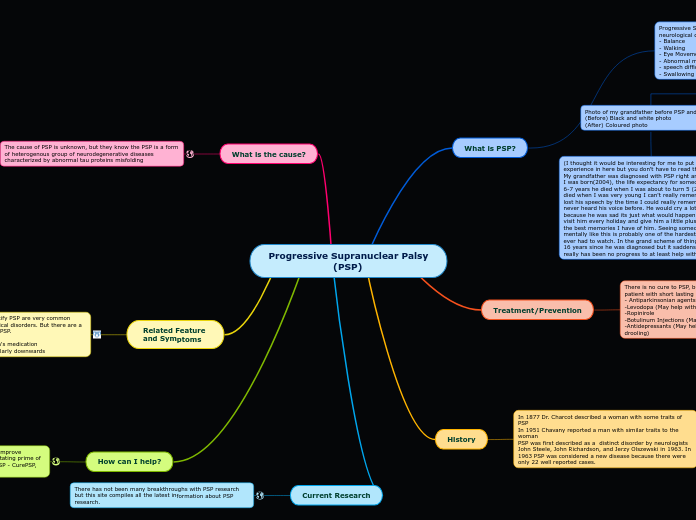Progressive Supranuclear Palsy
(PSP)
What is PSP?
Progressive Supranuclear Palsy is a rare degenerative neurological disorder that can cause impairment to: - Balance
- Walking
- Eye Movement
- Abnormal muscle tone
- speech difficulties
- Swallowing
Photo of my grandfather before PSP and during
(Before) Black and white photo
(After) Coloured photo
(I thought it would be interesting for me to put some personal experience in here but you don't have to read this)
My grandfather was diagnosed with PSP right around the year I was born(2004), the life expectancy for someone with PSP is 6-7 years he died when I was about to turn 5 (2009). Since he died when I was very young I can't really remember him. He lost his speech by the time I could really remember him, I've never heard his voice before. He would cry a lot and it wasn't because he was sad its just what would happen. We would visit him every holiday and give him a little plushy these are the best memories I have of him. Seeing someone detartrate mentally like this is probably one of the hardest things I've ever had to watch. In the grand scheme of things its only been 16 years since he was diagnosed but it saddens me that there really has been no progress to at least help with the pain.
Treatment/Prevention
There is no cure to PSP, but some medication may provide the patient with short lasting relief. - Antiparkinsonian agents -Levodopa (May help with slowness, stiffness, and balance) -Ropinirole -Botulinum Injections (May help with excessive eye closing) -Antidepressants (May help with pain relief and decrease drooling)
History
In 1877 Dr. Charcot described a woman with some traits of PSP
In 1951 Chavany reported a man with similar traits to the woman
PSP was first described as a distinct disorder by neurologists John Steele, John Richardson, and Jerzy Olszewski in 1963. In 1963 PSP was considered a new disease because there were only 22 well reported cases.
What is the cause?
The cause of PSP is unknown, but they know the PSP is a form of heterogenous group of neurodegenerative diseases characterized by abnormal tau proteins misfolding
Subtopic
Related Feature
and Symptoms
Many of the traits that can identify PSP are very common amongst degenerative neurological disorders. But there are a few signs that can help identify PSP.
- Lack of shacking
- Poor/No response to Parkinson's medication
- Difficulty moving eyes, particularly downwards
How can I help?
Cure PSP is a nonprofit foundation working to improve awareness, education, care and cure for devastating prime of life neurodegenerative diseases. (About CurePSP - CurePSP, 2020)
Current Research
There has not been many breakthroughs with PSP research but this site compiles all the latest information about PSP research.
